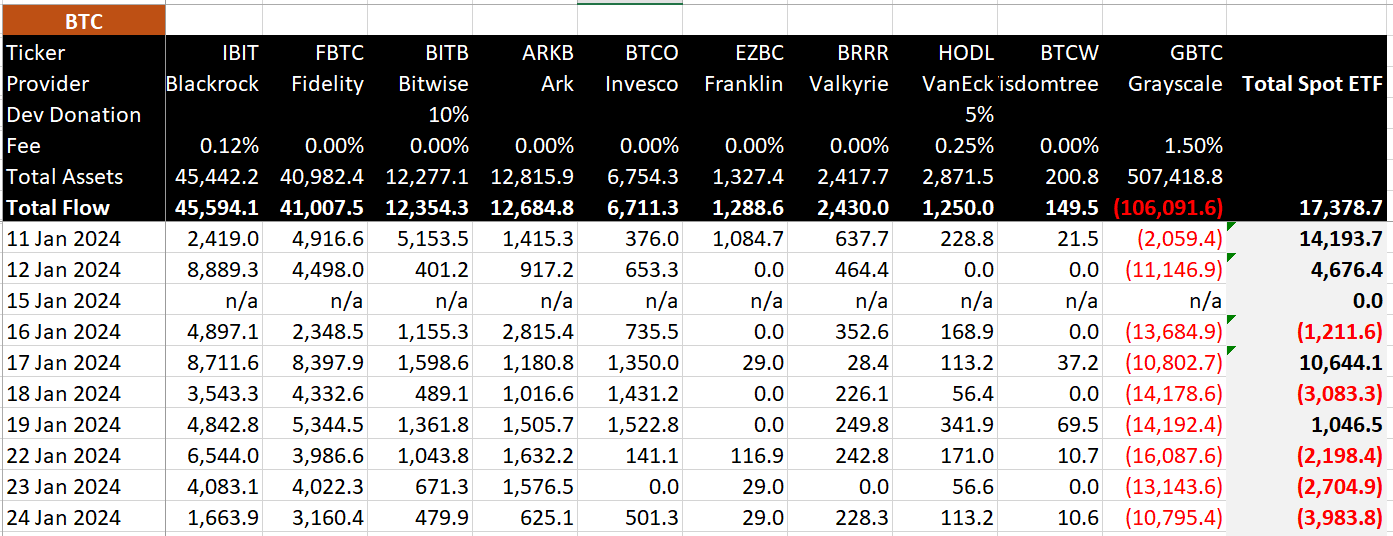The three major stock indexes in the U.S. – the S&P 500, Nasdaq, and the Dow Jones Industrial Average – have all notched new all-time highs this week.
This rally is happening despite growing pessimism towards the likelihood of rate cuts in the near future.
Until last month, the market assigned more than a 75% probability to the first rate cut being communicated in March. Since early this week, the market has turned on its heels regarding this outlook, now only assigning a 43% chance of a rate cut happening in March. As voiced in previous letters, I find this constructive as I figured the market was overestimating the likelihood of cuts happening soon.
Nevertheless, there’s a peculiar divergence going on with the market turning negative on rates and the stock markets surging.
The Fed is due for their next meeting on January 31st, by which time we will know more about the direction going forward.
ETF Inflows Have Yet to Be Priced in
Currently, BTC is trading down 20% since the launch of the ETFs. To some, this may sound significant, but in reality, it is quite normal for a Bitcoin bull market.
Nevertheless, I must be the first to confess that I did not anticipate the immediate downside for BTC post ETF-approval.
I thought that the buying pressure from the ETFs would be enough to support the market despite the high buildup in anticipation leading to the SEC giving the final approval.
While I must admit defeat on timing, I believe I will be right on the fundamentals.
1. Inflows into ETFs Meet Expectations
Since the launch of the ETFs, the combined ETFs have acquired an impressive 123.469 BTC in just 9 trading days.

More than half the size of Microstrategy already:
To illustrate how significant this number is, a useful comparison can be made to MicroStrategy Incorporated (NASDAQ:MSTR), which holds a total of 189.150 BTC.
According to flow data by BitMEX’s research team, the ETFs have already acquired BTC equal to 65% of Microstrategy’s holdings.
That’s massive.
A Last Move by Saylor?
With the ETFs having launched, there is less of a reason to consider an investment into Microstrategy, and I think Michael Saylor’s window of opportunity is closing. If we know anything about Saylor, it is that he is greedy for Bitcoin, so I imagine he is currently scrambling to find additional funds to deploy into BTC.
2. The ETFs Will Eat the Distribution of BTC
Another way to think about it is how the daily inflow into the ETFs compares to the daily issuance of BTC.
At this moment, 6.25 BTC is distributed into the network every 10 minutes, equating to the BTC supply growing by 900 BTC per day.
The Bitcoin ETFs are like a gigantic Pac-Man eating away at the free-floating BTC.
At the current average, more than 10,000 BTC is flowing into the ETFs daily. Even if we assume this rate of inflow will fade significantly, my bet is that the ETFs will powerfully outweigh the new distribution of BTC.
Keep in mind that after the halving event in April this year, the rate of supply will be cut in half to 450 BTC per day.
3. The Exodus from Grayscale Continues
That is drastic.
I was expecting some outflows from GBTC upon conversion when I saw their updated fee structure. However, I thought that the potential tax implications for holders would have been enough of a motivation to stay in GBTC.
Needless to say, I was wrong, and the reasons for that are the following:
A) There was a massive trading discount on GBTC to its underlying BTC value earlier in the year. This gap is now closing, and earlier buyers of GBTC can net the profit.
B) The FTX bankruptcy estate held 22 million units of GBTC and has reportedly sold around $1B worth of GBTC shares.
C) GBTC launched with fees multiple times higher than the competition. Why stay in GBTC if the same product offered by Blackrock or Bitwise is 20% of the cost?
The question remains whether this bleed of GBTC will continue.
I imagine the outflows will either continue at diminishing rates or that Grayscale plugs the hole in their ship by presenting a lower fee schedule to investors.
What Happens Next?
It’s easy to get absorbed by the whole “Bitcoin ETF saga” and think that is all that is driving the market.
Therefore, I think it is valuable to remember that what is more important than anything else when trading digital assets is investor behavior and narratives.
Before the launch of the ETFs, the markets were expecting massive inflows. The market now experienced those inflows but regretably the outflows of GBTC have outpowered the inflows on several trading days.
This is important for the supply and dynamics but likely it is even more important for market sentiment, and right now the outflows of GBTC function as a mood killer for what was thought to be a “staircase to heaven” type event.
The ETFs Launch is a Success
That said, I think anyone who believes the launch of the ETFs is nothing but a spectacular success is missing the big picture. An inflow of over 10,000 BTC daily is not to be taken lightly, and at some point, that demand is going to influence the supply.
